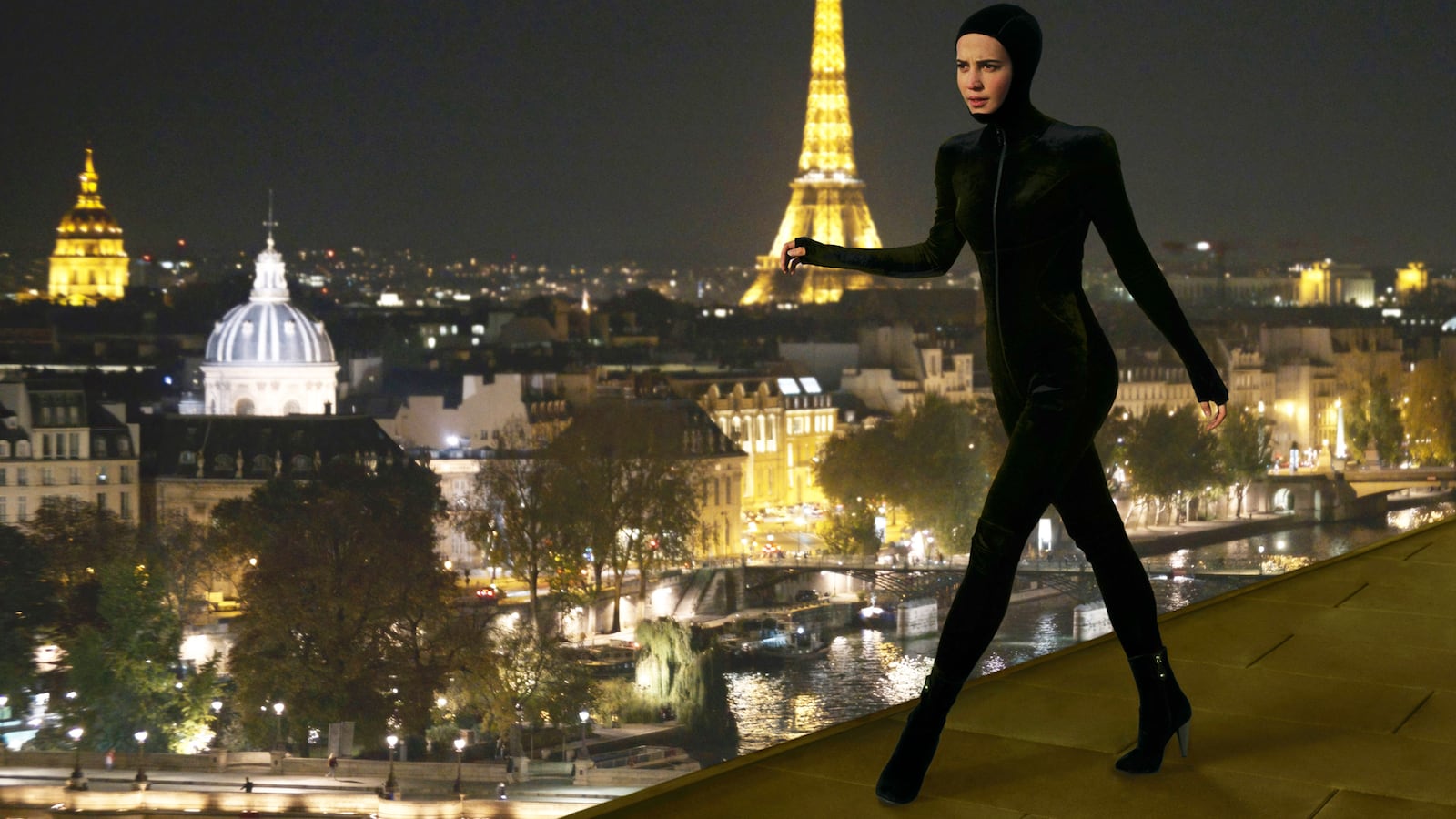Olivier Assayas’ 1996 Irma Vep is one of the great self-reflexive films about both filmmaking and the tumultuous and ever-shifting state of people, artists and the industry, detailing the bumpy production of a remake of Louis Feuillade’s 1915-1916 silent serial Les Vampires by a renowned old-school French director (legend Jean-Pierre Léaud) and a fish-out-of-water Hong Kong star (Maggie Cheung). Vibrant, chaotic and sharply attuned to the fluctuating condition of its many figures and competing forces, it’s an electric exploration of the intersection of art and commerce, reality and fantasy, and the physical and the ghostly, made at a moment in time when the lines between intellectual and blockbuster cinema were crisscrossing. It’s heady stuff, and infused with a dexterity and sensuality epitomized by the iconic sight of Cheung’s actress donning a black latex bodysuit.
That Assayas has now revisited Irma Vep as an eight-episode HBO miniseries—produced by A24—is thus not only proof of the business’ move toward streaming TV, but of the writer/director’s own canny recognition and embrace of that change, which he addresses with the sort of playful, oblique complexity that has long been his trademark. Premiering June 6, Assayas’ do-over is an expansion that substitutes Cheung with Alicia Vikander as Mira, an American actress riding high after the success of a superhero tentpole. As her follow-up, Mira has chosen to collaborate in Paris with volatile director René Vidal (the excellent Vincent Macaigne) on a multi-part TV version of Les Vampires called Irma Vep that’s based on his prior celebrated film of the same name that starred a Chinese actress whom René subsequently married and then divorced—just as Assayas did with Cheung. Thus, whereas Léaud’s original Irma Vep director was the embodiment of the French New Wave, here René proves a proxy for Assayas himself, struggling to simultaneously grapple with the specters of the past and the turbulent ups and downs of his temperamental cast and crew.
Formally speaking, Assayas’ new Irma Vep isn’t as overtly daring as its predecessor, and one suspects that’s on purpose—a cagey commentary on the unique demands of the small-screen arena in which he’s currently operating. Such self-analysis is the lifeblood of Assayas’ series, which concerns Mira’s navigation of a project that’s in near-constant flux, and a career that pits creative desires against financial considerations. René’s past on-set violence and misconduct has made insuring him a headache for producers. Mira’s agent Zelda (Carrie Brownstein) wants the actress to ditch René’s show and make a lucrative sequel-reboot of Silver Surfer. Compounding matters further, Mira is still getting over being dumped by her former assistant Laurie (Adria Arjona), who’s shacked up with Mira’s superhero-movie director but continues to cruelly toy with her ex’s affections. Mira’s latest co-stars, meanwhile, are headcases: lead Edmond (Vincent Lacoste) is a chronically insecure complainer who fears that his character is being marginalized and mocked, and Gottfried (Lars Eidinger) is an unrepentant crackhead hedonist who, in an especially funny bit, explains his lunatic reasons for ditching homosexuality in favor of a reactionary right-wing ethos.
With expected Day for Night-style flair, replete with numerous juxtapositions of footage from Les Vampires and René’s attempt at reimagining those very incidents for his own redo, Assayas immerses us in the behind-the-scenes insanity of a large-scale production such as this, where everyone is a neurotic mess and/or desperately struggling to get their job done. Fights and freak-outs are routine, as are debates about the crass commercialization of art (also subtly evoked by Metallica and Nirvana T-shirts) and, in particular, the oh-so-relevant idea that distending beloved movies into streaming shows is an ignoble capitulation to contemporary market trends. Providing small parts for actors from the original Irma Vep, Assayas digs deep into the very nature of his own endeavor with a sense of humor and, more importantly, a lack of overt judgement; as is his wont, the writer/director proves less interested in definitive answers than in creating a swirling dramatic space in which all these topical ideas can emerge and clash.
To that end, perhaps the most amusing exchange in the first four episodes of Irma Vep (which were all that were provided for press) takes place between René and his financier, who makes clear that René’s series is really a “niche market… prestige product” that won’t have much binge-watching potential; the production’s priority is to keep Mira happy so she’ll agree to a global promotional campaign for a perfume brand. Undoubtedly, the same isn’t true of Assayas’ own series. Yet the push-pull between what’s authentic and what’s make-believe is a source of anxious energy throughout. Better still, that tension grows stronger with each passing hour as additional characters are introduced and meta layers materialize, culminating with a dream sequence that finds René wrestling with regret and sorrow during an unexpected encounter with his former headliner/spouse Jade, who presses him on the reason he chose to make his second Irma Vep with an American rather than a Chinese actress.
Irma Vep is auteurist television in its purest form. Moreover, it’s willing to poke fun at that very fact, as when René proclaims—in a nod to critical debates of the past few years—that his TV venture is really an eight-hour film split into separate installments. If there’s a shortcoming to Assayas’ latest, it’s that Vikander isn’t as magnetic and enchanting a presence as Cheung, and the director’s decision to place less emphasis on her signature outfit drains the proceedings of a good bit of its sexualized dynamism. Irma Vep is blandest when its focus is most squarely on Mira’s ho-hum romantic entanglements and inner conflicts. Instead, she functions best as a tour-guide device for the show’s wider examination of 21st-century moviemaking in all its opposing interests, wacko personalities, and logistical and artistic stresses and strains.
Whether that proves too inside-baseball for mainstream audiences remains to be seen. Then again, one suspects that by the time it reaches its conclusion, Irma Vep will have cannily tackled and subverted that notion as well.






